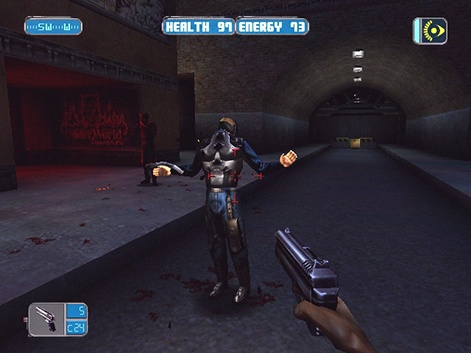There are few game developers who have had such an impact on the games industry as Warren Spector in his almost-30 years.
He’s worked on classic and influential titles, such as the Ultima series, Wing Commander, Thief, System Shock, and was the creative force behind the iconic Deus Ex (more on that in a few weeks). But, going back to 1989 when he joined Origin, what drew him to making video games?
“[It] was what made anyone want to get into game development - I loved games,” he says.
“I mean, I was an avid player of tabletop and digital games. What better way to make a living than making games. How did I get in? Frankly, it was total luck. I was working on my doctorate and teaching classes as part of the program I was in. The department took away my classes so I had no way to make a living. Got a call from a friend who was working at a tiny tabletop game company, Steve Jackson Games. Got a job there. And the rest is history.”
The list of people that Spector has worked with over the years – having held roles at legendary development studios like Origin, Looking Glass and Ion Storm – makes for some pretty impressive reading.
“I always say I'm the luckiest guy in the games business,” he says. “I got to work with and learn from the best - Steve Jackson, Richard Garriott, Chris Roberts, Paul Neurath, Doug Church, John Romero, Tom Hall. I like to think maybe I taught them a thing or two, too, but I know I got an education from them.
"The interesting thing was no two of them worked the same way, so I got a look at just about every way you could make a game and synthesise the stuff that made sense to me into my own utterly chaotic, team-maddening approach.”

With a career as illustrious and prolific as Spector’s, it might be hard for the developer to pick out his proudest moment; but he is able to narrow it down to two.
“The first was shipping Deus Ex, against formidable odds,” he says.
“That's the one time I closed my eyes and imagined the way a game would feel and play and, years later, opened my eyes and there was that game. I owe that to John Romero, Harvey Smith, Chris Norden and Jay Lee, and the rest of the team. That was a gift.
“The second proudest moment was winning the Lifetime Achievement award at GDC. I mean, having other people tell you that you made a difference - not that you made a lot of damn money for someone, but that you made a difference - that was special. It was also nice to have a public forum where I could thank all my teams, the folks who made ‘my’ award possible. It really belongs to all of them.”
But what advice would he offer to someone looking to get into games development?
“Well, number one is a do-as-I-say-not-as-I-do piece of advice - learn to code, at least a little bit,” he explains.
“It’s easy to forget that we make software and speaking the language of programmers will make you a better developer. Second is probably to get the best and broadest education you can. It doesn't have to be at a game development program. Learn about history and economics and psychology... hone your written and spoken communication skills... You never know what you're going to need to know on any given project, so a broad-based education – yes, even the humanities! – will stand you in good stead.”
Deus Ex was the one time I closed my eyes and imagined the way a game would feel and play and, years later, opened my eyes and there was that gameWarren Spector
After working at Ion Storm Austin, Spector left and set up his own company, Junction Point. But in 2007, the studio was purchased by Disney to make Epic Mickey.
“Working with Disney was mostly great. I mean, there's a lot of bureaucracy to deal with and there were plenty of executives who didn't get or even care about games. But that's to be expected at a huge media company like that,” Spector says.
"The great part was getting to work with the company's creatives - Disney Interactive was full of dedicated game developers. And it was great working with the folks at the Archives and Feature Animation and Pixar and the Character Voice folks. At Disney there's a real sense that everyone's on a mission - the same mission - and it's bigger than any one person's ambitions. That feeling of mission was really powerful. I've never actually felt that at a game publisher or even at a game development studio.”
Junction Point was closed in 2013 following the release of a second Epic Mickey title. Understandably, Spector says he was a dark time for him, with the developer taking half a year off, before deciding that he needed a fresh challenge.
“When Disney shut Junction Point down, I felt pretty low,” he admits. “I’d been making games for over 30 years, if you include my tabletop days, and someone had just taken my baby away from me. That was hard. So I sat down, for about 6 months, trying to figure out what to do next.
“I was going to do another start-up but, frankly, realised I just needed some new challenges. I wanted to try something I'd never done before.Then, out of the blue, the Dean of the College of Communication at the University of Texas called and asked if I wanted to build a game development certificate program, from scratch. Make it what I thought it should be. I mean, I'd taught years before, when I was working on my PhD, but I wondered what it would be like to do that full-time. So I made a three-year commitment and signed on.”
Certainly, in the UK, much ink has been spilt talking about how education around video games can be improved. But how does Spector think that this can be bettered?
“Man, could this get me in trouble... The biggest thing games education needs is more people who've actually made games,” he says.
“There are lots of people teaching whose resumes couldn't get them hired at a game development studio or publisher. More industry or indie people who WANT to teach would help a lot. Problem is, people who want to make games, tend to make games and not teach about them.
“Another thing I think would help would be more courses in games history and criticism. The game business - mainstream and indie - has virtually no sense of institutional history. I mean, I go to GDC and listen to talks my friends were giving 20 years ago. Same stuff. Drives me nuts. And we have very little vocabulary for talking about games in any way deeper than ‘fun/not fun’. Mediums grow when people can think about them more deeply than that. So, more pros, more history, more criticism.”

Despite ducking out of the sector in 2013, Spector returned to games development in February 2016 when the chance to work at OtherSide Entertainment as studio director arose. Here he is developing new entries in the Ultima and System Shock series, both franchises he has had a hand in in the past.
“It's been great working with OtherSide. Paul Neurath, the company founder – and co-founder of the late lamented Looking Glass Technologies – has always been one of my mentors and even at this late date I still learn from him every day,” he says.
“And it's always an interesting and rewarding challenge to build a team from scratch, like I am on System Shock 3. It's also nice to see games like Shock3 and Underworld Ascendant, OtherSide's other title in development, coming back. The fact that there's a new and growing market for what we used to call ‘immersive simulations’ is really gratifying. And, finally, it's been great working with a publisher like Starbreeze - as developers themselves, they really understand what goes on at OtherSide and they've been both hands-off and helpful depending on what we needed. So, yeah, so far so good.”
But finally, we ask Spector, what is the biggest lesson he has learned in his 30 years?
“You better love what you're doing or game development will kill you,” he tells us.
“Making games is really hard and you really do have to love it.”













